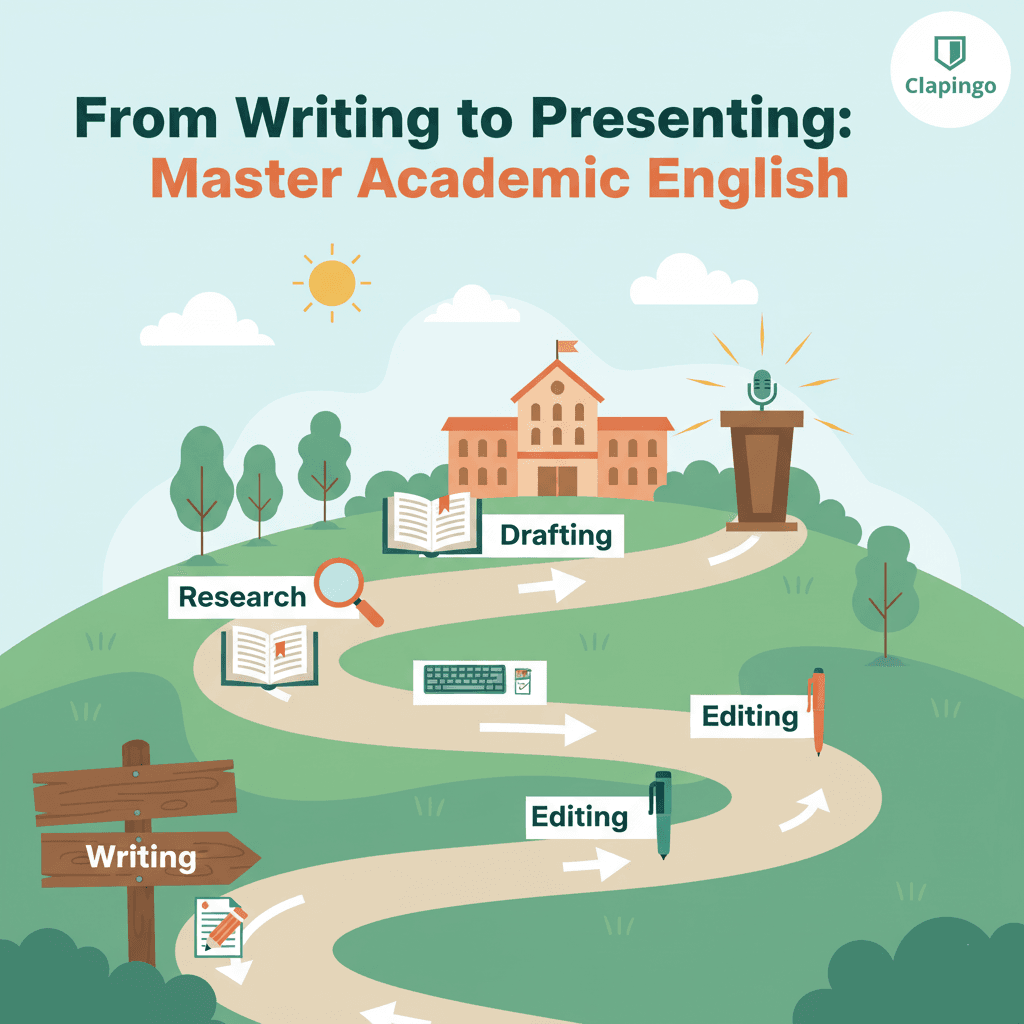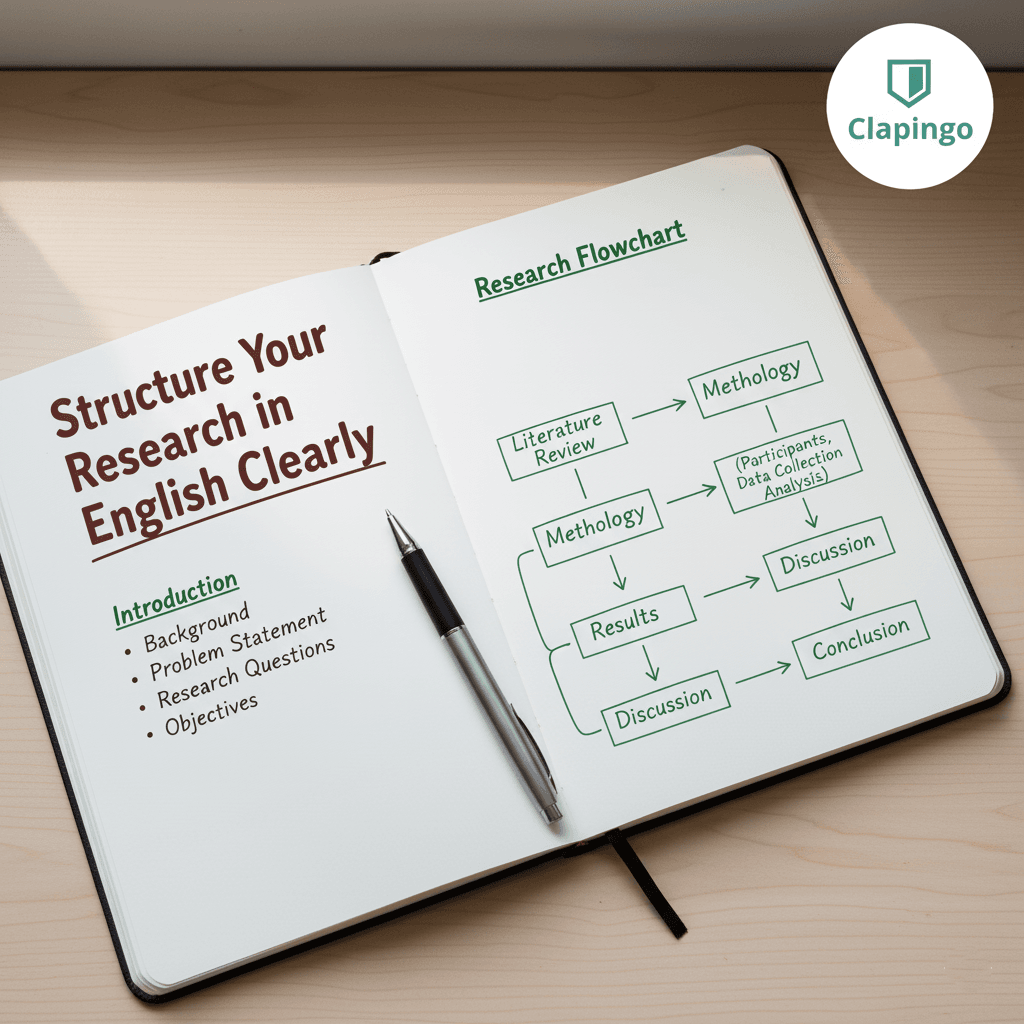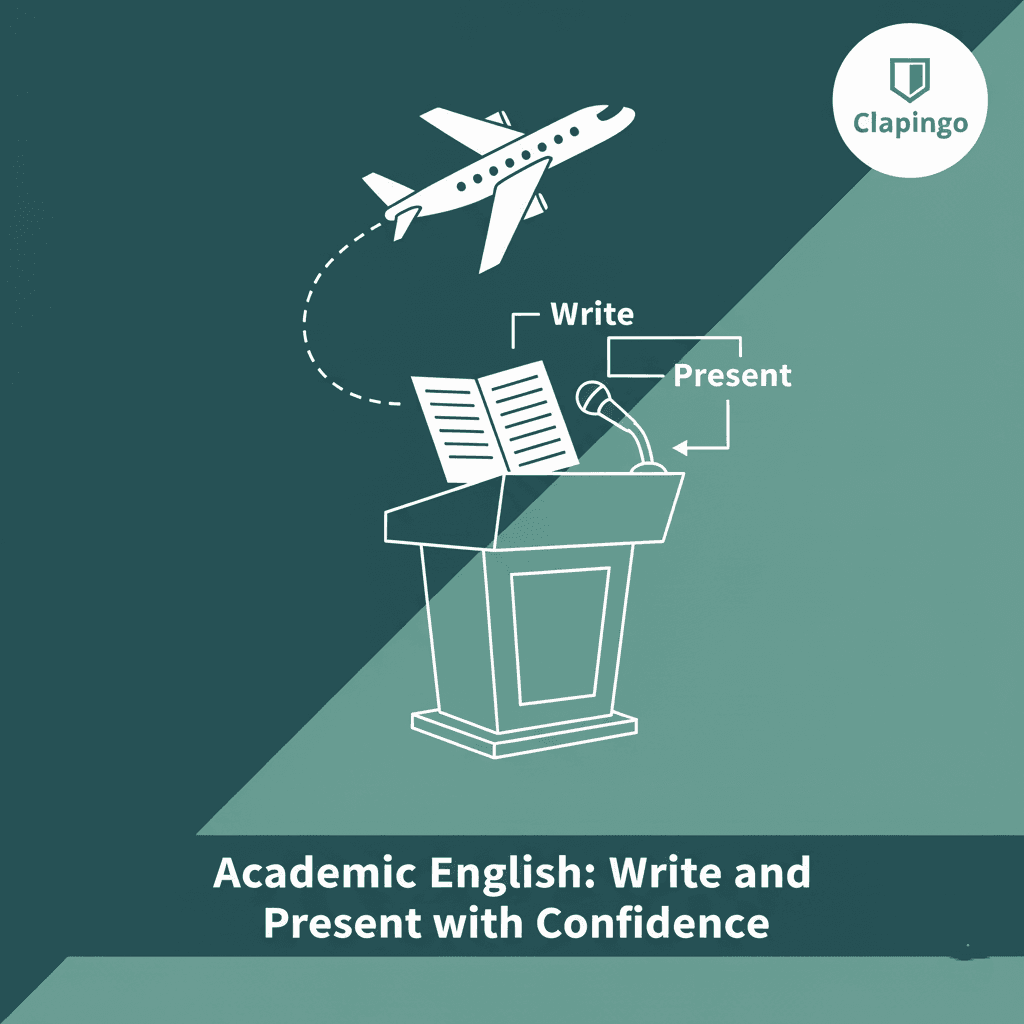English for Academics: Mastering Paper Writing and Conference Presentations
Enhance your Academic English skills with tips on research paper writing, scholarly communication, and conference presentations. Master thesis defense and scholarly speaking with Clapingo.

Master Academic English
In the global academic community, proficiency in Academic English is essential. Whether you're drafting a research paper, preparing for a thesis defense, or presenting at a conference, clear and precise communication can define your success. This guide explores how to improve your Academic English skills, sharpen conference presentation skills, and navigate scholarly communication with confidence.
Clapingo’s expert-led platform can help you practice Academic English in real-life scenarios, from writing papers to presenting ideas effectively. By dedicating time to refining your writing and speaking, you not only convey your research better but also gain credibility in the academic world.
Why Academic English Matters
Academic English differs from casual or professional English. It demands precision, formality, and clarity. Scholars need to convey complex ideas without ambiguity. Poor academic writing can reduce the impact of groundbreaking research.
Key aspects of Academic English include:
Formal tone and structure: Avoid colloquial expressions and slang.
Clear and concise argumentation: Present ideas logically, avoiding unnecessary repetition.
Proper citation and referencing: Recognize other researchers' contributions.
Logical flow and coherence: Each paragraph and section should connect seamlessly.
Did you know?
Over 60% of international students report difficulties in research paper writing due to limited Academic English proficiency. Building strong skills can directly improve your academic recognition and publication success.

Master Academic English & Research Paper Writing
Research Paper Writing: From Idea to Publication
Writing a research paper involves multiple stages. Academic English skills are critical at every step.
1. Choosing the Topic
Identify gaps in current research by reading recent publications.
Formulate a clear, specific research question.
Ensure relevance, feasibility, and originality.
Example: "Investigating the effects of virtual learning environments on graduate-level research productivity."
2. Literature Review
Summarize and critically evaluate existing studies.
Use Academic English phrases like:
"This study examines…"
"Previous research indicates…"
"Contrary to existing literature, our findings suggest…"
Tip: Create an annotated bibliography to track important points and language usage.
3. Structuring Your Paper
Section | Key Points | Example Phrases |
|---|---|---|
Abstract | Summarize objectives, methods, results, conclusion | "This paper explores…" |
Introduction | State problem, research question, relevance | "The aim of this study is…" |
Methodology | Describe research methods, instruments, sample | "Data were collected using…" |
Results | Present findings objectively | "The results indicate…" |
Discussion | Interpret results, compare with literature | "These findings suggest…" |
Conclusion | Summarize implications, future research | "In conclusion, the study highlights…" |
Practical Exercise: Draft an abstract for your current research using these phrases. Share it with a peer or mentor for feedback.
4. Revising and Proofreading
Check grammar, punctuation, and Academic English usage.
Ensure clarity, coherence, and logical flow.
Use professional tools like Grammarly or seek peer feedback.
Tips & Tricks:
Avoid informal words or contractions.
Prefer passive voice in methods: "Data were analyzed…".
Use linking words for smooth flow: "However," "Therefore," "Consequently."
Read your paper aloud to identify awkward phrasing.

Master Academic English & Present Research Papers
Conference Presentation Skills: Engaging Your Audience
Presenting at conferences is an opportunity to showcase research and gain feedback. Strong conference presentation skills are essential.
1. Structuring Your Talk
Introduction: Hook your audience, state research question.
Methods & Results: Present data clearly, use visuals.
Conclusion: Highlight significance, implications, and next steps.
Tip: Include a 30-second story or anecdote to make your research relatable.
2. Designing Visual Aids
Use simple, uncluttered slides.
Include charts, graphs, and images to illustrate points.
Keep text minimal; highlight key takeaways.
Use high-contrast colors and legible fonts.
3. Speaking Confidently
Practice pronunciation and Academic English expressions.
Engage audience with questions: "Have you encountered similar challenges in your research?"
Maintain eye contact, moderate pace, and avoid filler words.
Record practice sessions to improve timing and clarity.
4. Handling Q&A Sessions
Listen carefully, clarify questions if needed.
Use polite and professional phrases:
"That’s an interesting point…"
"Thank you for your question…"
Admit if unsure: "I don’t have the exact data on that yet, but I’ll follow up."
Did you know?
Studies show that presenters who speak clearly in Academic English are more likely to have their papers cited and collaborations initiated.
Scholarly Communication: Writing Beyond Papers
Academic English is also essential in broader scholarly communication.
1. Thesis Defense
Prepare a concise summary of your research.
Anticipate potential questions from the committee.
Use formal Academic English:
"The primary objective of my study was…"
"These results provide evidence that…"
Practice with mock defenses via Clapingo.
2. Peer Reviews
Maintain a constructive and polite tone.
Use expressions like:
"The manuscript is well-written, but…"
"Consider providing more evidence for…"
Focus on clarity, methodology, and results rather than personal opinions.
3. Academic Networking
Engage peers during conferences or online forums.
Introduce yourself formally:
"Hello, I’m [Name], a PhD candidate at…"
"My research focuses on…"
Share concise summaries of your research and invite feedback.
Tip: Maintain a professional LinkedIn or ResearchGate profile to enhance your scholarly presence.

Master Academic English & Present Research Papers With Confidence
Common Challenges in Academic English
Challenge | Solution | Example |
Complex vocabulary | Learn domain-specific terms; simplify sentences | "Utilize" → "Use" if clarity improves |
Grammar errors | Practice with peer reviews and writing tools | "He have completed…" → "He has completed…" |
Presentation anxiety | Practice with small audiences or Clapingo sessions | Record and review mock talks |
Time management | Break tasks into smaller steps with deadlines | Schedule writing, revising, and practicing separately |
Tips & Tricks:
Keep a glossary of academic terms.
Read widely in your field to internalize sentence structures.
Record and listen to your presentations to improve clarity.
Join study groups to practice research discussion in Academic English.
How Clapingo Can Help
Clapingo offers tailored English coaching for academics. Key features include:
One-on-one sessions: Focused on research writing or presentation practice.
Mock presentations: Simulate conference environments for confidence-building.
Feedback on Academic English: Grammar, tone, and clarity improvements.
Flexible schedules: Practice anytime before real events.
Sample Session Plan:
15 min: Review research paper or slides.
25 min: Mock presentation with live feedback.
15 min: Discussion on scholarly communication nuances.
Clapingo Advantage: Learn by doing, receive instant feedback, and gradually build confidence in academic contexts. This practical approach allows you to master research writing and conference presentations simultaneously.
Did You Know?
Presenting in clear Academic English increases your research visibility.
Well-written research papers have a higher chance of acceptance in top journals.
Many scholars underestimate the importance of rehearsal before conference presentations.
Strong scholarly communication can lead to collaborations and funding opportunities.
Practical Exercises & Templates
To make this guide actionable, each section now includes exercises and sentence templates.
Sample Exercises for Paper Writing
Abstract Writing: Draft a 150-word abstract using the structure: objective → method → result → conclusion.
Introduction Drafting: Write an introduction for your topic using linking phrases: "However," "Consequently," "In this study…"
Discussion Practice: Summarize findings and compare with two references from recent journals.
Template Sentences for Research Papers:
"This study examines…"
"The results indicate…"
"These findings suggest…"
"In conclusion, the research highlights…"
Sample Exercises for Conference Presentations
Slide Design Practice: Create 5 slides summarizing your research; keep each slide under 30 words.
Mock Presentation: Record a 5-minute talk; focus on pronunciation, tone, and pace.
Q&A Simulation: Write down 5 potential questions and practice answers using polite Academic English.
Template Phrases for Presentations:
"The aim of my presentation is…"
"As shown in this figure…"
"This finding demonstrates…"
"Thank you for your question; my response is…"
Sample Exercises for Scholarly Communication
Email Practice: Draft an email to a professor introducing yourself and summarizing your research in 3–4 sentences.
Peer Review Simulation: Review a short research excerpt; provide two constructive feedback points using phrases like:
"The manuscript is clear, but consider…"
"You might clarify…"
Networking Pitch: Prepare a 30-second introduction of your research for conferences or seminars.
Template Phrases for Emails and Networking:
"Dear [Name], I am writing to…"
"My research focuses on…"
"I would appreciate your feedback on…"
"Hello, I’m [Name], a PhD candidate at…"
Mini Academic Vocabulary Glossary
Word/Phrase | Meaning | Example Usage |
|---|---|---|
Efficacy | Effectiveness | "This method demonstrates greater efficacy compared to alternatives." |
Facilitate | Make easier | "The tool facilitates data collection and analysis." |
Empirical | Based on observation | "Empirical evidence supports the hypothesis." |
Methodology | Study of methods | "The methodology section details the data collection process." |
Implications | Possible effects or outcomes | "The findings have implications for future research in digital learning." |
Hypothesis | Testable statement | "The hypothesis predicts that…" |
Peer Review | Evaluation by experts | "The article underwent rigorous peer review." |
Scholarly | Related to academic study | "Scholarly communication requires clarity and formality." |
Exercise: Pick 5 words from the glossary, write your own sentences, and incorporate them into your paper or presentation draft.
Practice Routine Recommendation
Daily: 30 mins reading academic papers; highlight new vocabulary.
Weekly: Write a 250-word section of a paper or prepare 5 slides.
Monthly: Conduct a mock presentation and peer review session.
Continuous: Engage with Clapingo tutors for feedback and improvement.
Mastering Academic English is a journey that combines rigorous writing, confident presentations, and effective scholarly communication. Through structured exercises, sentence templates, and a dedicated vocabulary practice routine, you can significantly improve research paper writing, conference presentation skills, and overall scholarly impact.
Clapingo provides structured support, real-time feedback, and personalized guidance to help you achieve mastery in Academic English. Start your journey today to excel in research, defend your thesis successfully, and shine at international conferences!
The Role of Tone and Register in Academic English
Explanation: Tone determines how your writing is perceived. Academic English requires a formal, neutral, and objective tone. Avoid slang, colloquialisms, and overly personal statements. Use third-person where possible, unless first-person is required (e.g., in reflective sections).
Example:
Informal: “I think this method is better.”
Academic: “This method demonstrates greater efficacy than the alternatives.”
Exercise: Rewrite five informal sentences from your draft into formal academic style.
Clapingo Tip: Use hedging words (“suggests,” “indicates”) to sound objective.
Building a Strong Academic Vocabulary
Explanation: A robust academic vocabulary makes your writing precise and authoritative. Focus on domain-specific terms, transition phrases, and formal alternatives to everyday words.
Examples: “Get” → “Obtain,” “Help” → “Facilitate,” “Show” → “Demonstrate.”
Exercise: Pick 10 common words from your draft and replace them with academic alternatives. Write a new paragraph using these words.
Clapingo Tip: Keep a dedicated vocabulary journal to track and practice new words.
Understanding Academic Style Guides (APA, MLA, Chicago)
Explanation: Style guides ensure consistency in citations, references, and formatting. Choosing the correct style depends on your discipline.
Comparison Table:
Style | Discipline | In-text Example | Reference Example |
|---|---|---|---|
APA | Social sciences | (Smith, 2023) | Smith, J. (2023). Title. Journal, 12(3), 45-56. |
MLA | Humanities | (Smith 45) | Smith, John. Title. Journal, vol. 12, no. 3, 2023, pp. 45-56. |
Chicago | History | (Smith 2023, 45) | Smith, John. 2023. “Title.” Journal 12 (3): 45-56. |
Exercise: Convert three references in your draft into APA, MLA, and Chicago formats. |
Crafting an Effective Abstract
Explanation: The abstract is a concise summary of your research (150–250 words). Include objectives, methods, results, and conclusions. Avoid jargon and unnecessary details.
Example: “This study investigates the impact of digital libraries on graduate research productivity. Results indicate significant improvements in research efficiency, highlighting implications for future digital resource development.”
Exercise: Write a 150-word abstract for your current research. Use template phrases: “This paper investigates…,” “The results indicate…,” “Implications include…”
Writing Introductions that Capture Attention
Explanation: A strong introduction establishes context, identifies research gaps, and presents the research question. Each paragraph should flow logically into the next.
Example Phrases: “The aim of this study is…,” “Recent research highlights…,” “However, a gap remains…”
Exercise: Draft a full introduction using at least five linking phrases.
Perfecting the Discussion Section
Explanation: The discussion interprets your findings, relates them to existing literature, addresses limitations, and suggests implications.
Example Phrases: “These findings align with…,” “Contrary to prior studies…,” “This suggests that…”
Exercise: Write one discussion paragraph comparing your findings to two published studies.
Writing a Persuasive Conclusion
Explanation: The conclusion summarizes contributions, highlights significance, and proposes future research. Avoid repeating content word-for-word from previous sections.
Template Phrases: “In conclusion, this study demonstrates…,” “Future research should explore…,” “These findings underscore…”
Exercise: Draft a 100–150 word conclusion using at least three template phrases.

Master Global Academic English & Present Research Papers With Confidence
Academic English for Non-Native Speakers
Explanation: Common challenges include article use, verb tense consistency, plurals, and prepositions. Mastering these is essential for clarity.
Examples: “Data shows” → “Data show,” “She has wrote” → “She has written.”
Exercise: Identify and correct 10 non-native errors from your draft. Practice using corrected forms in sentences.
Avoiding Common Pitfalls in Research Paper Writing
Explanation: Frequent issues include redundancy, jargon, unclear argumentation, and plagiarism. Peer feedback and proper referencing are key solutions.
Exercise: Review a paragraph and simplify sentences, remove repetition, and clarify points. Highlight jargon and replace with clear language.
Using Technology to Improve Academic Writing
Explanation: Tools like Grammarly (grammar), Zotero (references), Quillbot (paraphrasing), and Turnitin (plagiarism) can streamline writing.
Exercise: Check your draft with Grammarly, organize references with Zotero, and paraphrase a complex paragraph with Quillbot.
Storytelling in Academic Presentations
Explanation: Narratives make research memorable. Begin with a real-world problem, connect to your findings, and conclude with impact.
Template Phrase: “Consider a scenario where…”
Exercise: Prepare a 1-minute story linking a real-world problem to your research. Present it to a peer.
Non-Verbal Communication in Conferences
Explanation: Body language, gestures, posture, and eye contact reinforce credibility. Avoid distracting movements and slouching.
Exercise: Record a 2-minute practice talk; review your posture, hand gestures, and facial expressions.
Handling Stage Fright Before a Conference
Explanation: Anxiety is common. Use deep breathing, visualization, and mock presentations to build confidence.
Exercise: Do a 5-minute breathing and visualization routine before a mock presentation.
Time Management During Presentations
Explanation: Structure your presentation strategically: Intro 10–15%, Methods & Results 50–60%, Conclusion 15–20%, Q&A 10%.
Exercise: Create a timed outline for your next talk and practice staying within limits.
Writing for Academic Journals
Explanation: Follow submission guidelines, target appropriate journals, and write clear cover letters. Highlight originality and significance.
Exercise: Draft a journal submission email and abstract tailored to a selected journal.
Writing Grant Proposals in Academic English
Explanation: Focus on clarity, objectives, expected outcomes, and broader impact. Use formal, persuasive language.
Template Phrases: “This project aims to…,” “The expected outcomes include…”
Exercise: Outline a mini-proposal using Aim → Method → Outcome → Impact structure.
Networking and Small Talk at Academic Events
Explanation: Introduce yourself, summarize your research concisely, and show interest in others’ work.
Template Phrases: “Hello, I’m [Name], a PhD candidate at…,” “My research focuses on…”
Exercise: Prepare a 30-second research pitch for practice.
Email Etiquette in Scholarly Communication
Explanation: Use formal greetings, concise content, and professional closings. Avoid slang or informal expressions.
Template Phrases: “Dear [Name], I am writing regarding…,” “I would appreciate your feedback on…”
Exercise: Draft three practice emails to a professor, collaborator, and conference organizer.
Editing for Clarity and Precision
Explanation: Simplify sentences, remove redundancy, and use active voice where appropriate.
Example: “It is important to note that…” → “Notably…”
Exercise: Edit five sentences from your draft to improve clarity and conciseness.
The Future of Academic English in Global Research
Explanation: Trends such as AI, virtual collaboration, and multilingual research are reshaping Academic English. Awareness prepares you for international engagement.
Exercise: Write a 150-word reflection on how AI and global collaboration might influence your field.
Conclusion
Mastering Academic English is a journey that combines rigorous writing, confident presentations, and effective scholarly communication. By practicing research paper writing, enhancing conference presentation skills, and seeking constructive feedback, you can excel in the academic world.
Platforms like Clapingo provide structured support, real-time feedback, and personalized guidance to help you achieve mastery in Academic English. Whether you aim to publish in high-impact journals, defend your thesis successfully, or impress at international conferences, consistent practice and expert guidance are key.
Start your journey today with Clapingo and transform your academic communication skills. Master research papers, thesis defenses, and conference presentations with expert guidance!
Read Also: Creative Self-Introduction Ideas for Students: Unique Introduction Examples & 5 Special Tips
Comments
Your comment has been submitted